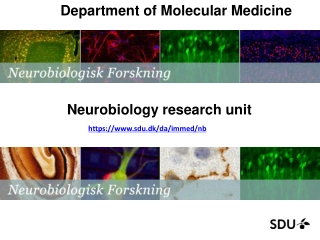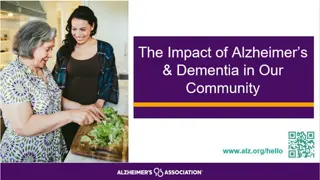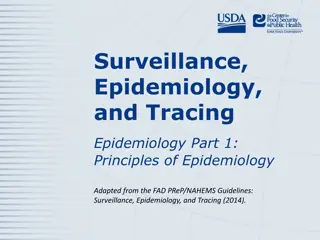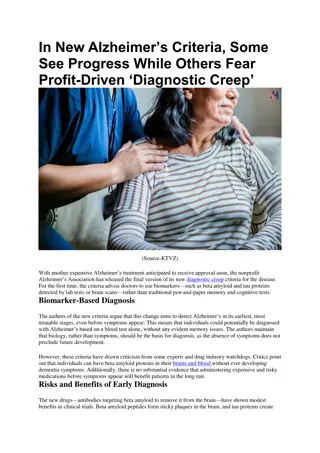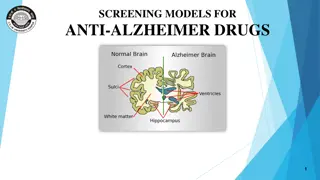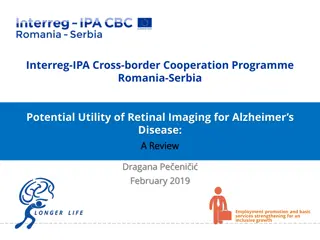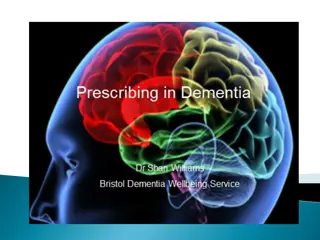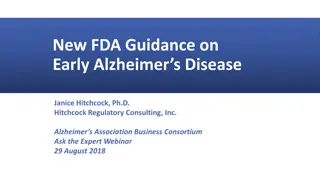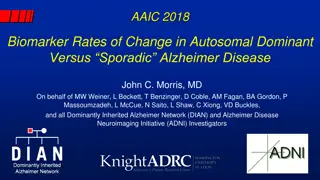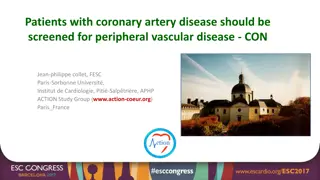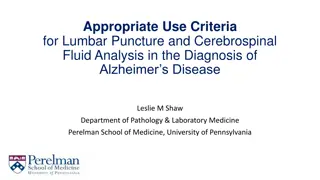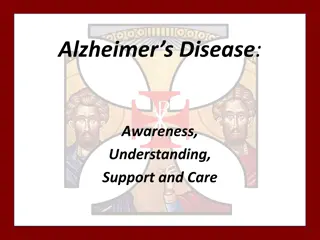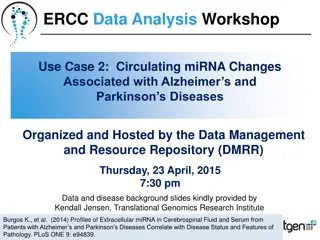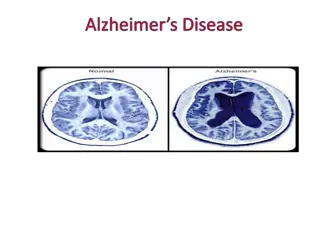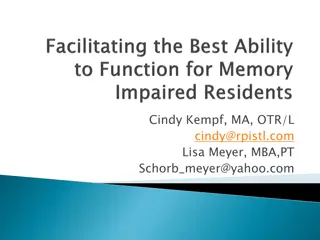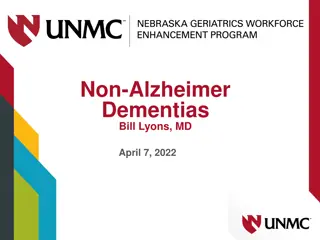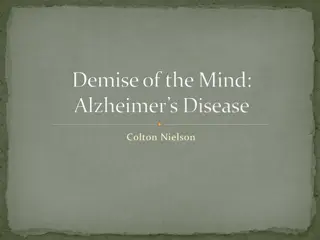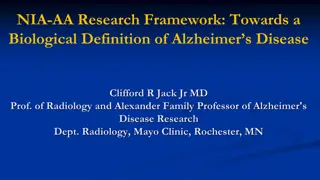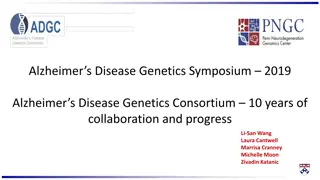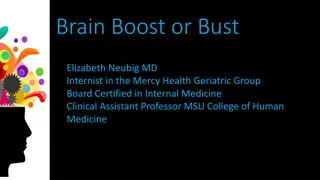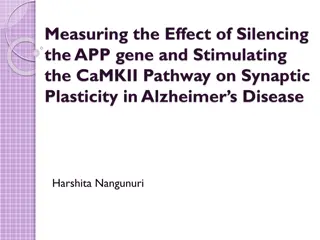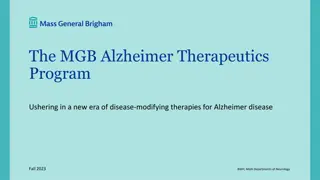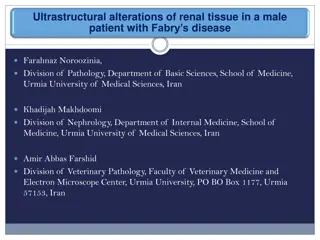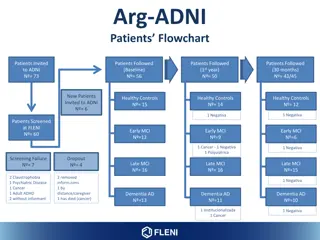Neurobiology research unit
The Department of Molecular Medicine's Neurobiology research unit focuses on improving the understanding of the central nervous system's response to injury and disease, including multiple sclerosis, Alzheimer's disease, Parkinson's disease, and stroke. They utilize molecular, cellular, and histologi
0 views • 15 slides
Advocating for Alzheimer's: Impactful Public Policy in Massachusetts
In Massachusetts, significant strides have been made in advocating for Alzheimer's disease through public policy efforts. Initiatives include the passage of the Alzheimer's & Dementia Act, funding for dementia care coordination, and promoting public awareness campaigns. Legislative actions aim to im
0 views • 29 slides
Understanding the Natural History of Disease Development and Prevention
The natural history of disease development outlines the progression of a disease in an individual without intervention, from exposure to outcome. Learning objectives include defining prevention terms, understanding disease severity, prevention levels, and intervention measures. Studying disease prog
4 views • 16 slides
Principles of Epidemiology: Understanding Disease Occurrence and Surveillance
Epidemiology is the study of disease patterns, factors influencing disease occurrence, and the core functions of surveillance, field investigation, and analytic studies. It involves understanding disease characteristics, natural history, and evaluating the effectiveness of activities to mitigate dis
1 views • 25 slides
In New Alzheimer | healthcare
Alzheimer\u2019s treatment anticipated to receive approval soon, the nonprofit Alzheimer\u2019s Association has released the final version of its new diagnostic creep criteria for the disease.
0 views • 2 slides
Understanding Dementia and Alzheimer's Disease
Dementia and Alzheimer's disease are neurocognitive disorders that impact a person's memory, cognitive functions, and social abilities. Alzheimer's is the most common form of dementia and is characterized by the presence of plaques and tangles in the brain. Symptoms of dementia include cognitive cha
0 views • 22 slides
Insights into Tyzzer's Disease: An Overview of a Bacterial Infection in Laboratory Animals
Tyzzer's disease is an acute bacterial infection affecting rodents and rabbits, caused by Clostridium piliforme. Discovered in 1917 by Ernest Tyzzer, the disease is characterized by necrotic lesions in the caecal mucosa, liver, and heart. Initially known as Bacillus piliformis, it was later renamed
2 views • 21 slides
Understanding Screening Models for Anti-Alzheimer Drugs
Alzheimer's disease is a prevalent neurodegenerative brain disorder characterized by memory loss and other cognitive impairments. This article discusses the etiology, risk factors, and pathophysiology of Alzheimer's disease, along with in-vitro screening models used to test potential drugs, focusing
0 views • 24 slides
Understanding Disease Control and Prevention in Epidemiology
This article discusses disease control processes in epidemiology, including reducing disease incidence, duration, and transmission. It covers public policy interventions, elimination, eradication, and extinction of infectious agents. It also highlights preventable causes of disease and different lev
2 views • 10 slides
Retinal Imaging for Alzheimer's Disease: A Comprehensive Review
The increasing prevalence of Alzheimer's disease (AD) necessitates sensitive screening technologies for early detection. Retinal imaging emerges as a promising tool due to its non-invasive nature, cost-effectiveness, and potential as a window to the brain. This review explores the utility of retinal
4 views • 10 slides
Pharmacological Management of Alzheimer's Disease and Cognitive Enhancers
Cognitive enhancers play a crucial role in managing Alzheimer's Disease, with Cholinesterase inhibitors (AChEI) like Donepezil, Galantamine, and Rivastigmine recommended for mild to moderate AD, and Memantine for moderate to severe cases. These medications act through different mechanisms, with AChE
0 views • 46 slides
Sungarden Terrace Compassionate Alzheimer's Care in Lemon Grove
Sungarden Terrace is a renowned Alzheimer's care facility located in Lemon Grove, offering compassionate and specialized care for individuals with Alzheimer's disease. Recognizing the unique challenges faced by those with Alzheimer's, Sungarden Terra
0 views • 11 slides
Innovative Master Thesis on Improving Alzheimer's Patients' Lives
Tim Henkelmann's Master thesis focuses on combining a drinking gadget with a board game to enhance the quality of life for Alzheimer's patients. The project, supervised by Prof. Gudrun Klinker, aims to address the symptoms and challenges faced by individuals with Alzheimer's disease, a widely spread
0 views • 36 slides
New FDA Guidance on Early Alzheimer's Disease - Janice Hitchcock, Ph.D.
Janice Hitchcock, Ph.D., discussed the new FDA guidance on early Alzheimer's disease in a webinar. The guidance highlights key sections such as introduction, background, and diagnostic criteria. It emphasizes the importance of early intervention, appropriate outcome measures, and diagnostic criteria
0 views • 13 slides
Biomarker Rates of Change in Autosomal Dominant vs. Sporadic Alzheimer Disease
Autosomal Dominant Alzheimer Disease (ADAD) and Sporadic Late Onset Alzheimer Disease (LOAD) show distinct clinical presentations, neuropathological features, and rates of progression. The DIAN-ADNI Comparison Study aims to investigate if ADAD and LOAD share the same pathophysiology and how they res
0 views • 16 slides
Understanding Dementia-Friendly Communities and Alzheimer's Disease Symptoms
Explore the concept of dementia-friendly communities and learn about the early symptoms of Alzheimer's disease. Discover how these communities support individuals with dementia to live fulfilling lives by providing safety, access to familiar locations, and opportunities to maintain social connection
0 views • 15 slides
Screening for Peripheral Vascular Disease in Patients with Coronary Artery Disease
Patients with coronary artery disease should be screened for peripheral vascular disease as it is a frequent integrator of global cardiovascular risk. The association of atherosclerosis in various arterial diseases highlights the importance of identifying multisite artery disease. The prevalence and
0 views • 23 slides
Appropriate Use Criteria for Lumbar Puncture in Alzheimer's Disease Diagnosis
Clinicians traditionally diagnose Alzheimer's Disease (AD) based on clinical criteria, but cerebrospinal fluid (CSF) AD biomarkers offer more reliable detection earlier in the disease course. This article discusses the criteria for lumbar puncture and CSF analysis in the diagnosis of AD, highlightin
0 views • 18 slides
Human Disease Symptom Network: Understanding Disease Relationships Through Symptoms and Genes
The Human Disease Symptom Network (HSDN) is constructed using a large-scale medical bibliographic records database to form a network of human diseases based on symptom similarities. By integrating disease-gene associations and protein-protein interaction data, correlations between symptom similarity
0 views • 37 slides
Preventing Alzheimer's Disease through Behavior Change Research
Investigative teams led by Jeffrey A. Katula, Ph.D., are exploring the impact of multidomain interventions involving nutrition, exercise, cognitive training, and vascular risk monitoring on cognitive decline in older adults at risk for Alzheimer's disease. The study focuses on achieving and sustaini
0 views • 15 slides
Understanding Alzheimer's Disease: A Comprehensive Overview
Alzheimer's Disease is a progressive condition that affects memory and cognitive functions, causing immense challenges for patients and caregivers. This article delves into the implications, symptoms, and societal impact of Alzheimer's, emphasizing the importance of awareness, support, and compassio
0 views • 23 slides
Circulating miRNA Changes in Alzheimer's and Parkinson's Diseases Analysis Workshop
Workshop focused on analyzing circulating miRNA changes associated with Alzheimer's and Parkinson's diseases using the Genboree Workbench and exceRpt small RNA-seq analysis pipeline. The study aimed to identify extracellular miRNA biomarkers correlating with disease status and progression, replicati
0 views • 20 slides
Understanding Bacterial Diseases of Fish: Columnaris Disease Overview
Columnaris disease, also known as Saddleback disease, is a common bacterial infection in fish that is often brought about by poor handling and high stress levels. This disease manifests as tail and fin rot, leading to rapid fish mortality. The causative organism, Cytophaga (formerly Flexibacter), is
0 views • 21 slides
Understanding Alzheimer's Disease: Causes, Symptoms & Impact
Alzheimer's disease is a degenerative brain disorder that affects memory, thinking abilities, personality, and mood. First described in 1906 by Dr. Alois Alzheimer, it is a chronic and irreversible condition with no known precise cause. Factors such as neurochemical imbalances and environmental infl
0 views • 41 slides
Understanding Alzheimer's Disease and Caregiver Stress
This content explores the impact of Alzheimer's disease on individuals and caregivers, covering statistics, characteristics of cognitive stages, caregiver challenges, and the progressive nature of the disease. It emphasizes the need for appropriate intervention strategies and the significant stress
0 views • 67 slides
Understanding Non-Alzheimer Dementias: Cases and Diagnoses
Explore intriguing clinical cases and differential diagnoses related to non-Alzheimer dementias, including symptoms, evaluations, and potential treatments. From B12 deficiency to vascular dementia, unravel the complexities of cognitive impairments in varied scenarios.
0 views • 28 slides
Understanding Alzheimer's Disease: Facts, Stages, and Impact
Alzheimer's Disease, first discovered in 1906, is a progressive brain condition that affects memory and cognitive function. It is the seventh leading cause of death in the U.S., with significant economic costs and a global impact. Risk factors include age, low mental ability in early life, head inju
0 views • 36 slides
Understanding Dementia and Alzheimer's Disease Management
Dementia and Alzheimer's Disease are significant health challenges with under-diagnosis and under-treatment issues. The prevalence of Alzheimer's is high, leading to a substantial societal cost. The natural history of Alzheimer's shows a progression of symptoms over time, with cholinergic dysfunctio
0 views • 37 slides
Understanding Alzheimer's Disease: A Biological Perspective
Alzheimer's disease is a complex condition characterized by a progressive loss of cognitive abilities. Dementia and Alzheimer's are often confused, but Alzheimer's involves specific pathological processes. The disease presents with a range of symptoms and can be influenced by various factors. The ev
0 views • 37 slides
Decoding Genetics: Insights from Alzheimer's Disease Symposium to Type 2 Diabetes Study
Explore the latest findings from the Alzheimer's Disease Genetics Symposium 2019 on disease mechanisms, drug targets, and genetic pathways. Dive into the progress made by the Alzheimer's Disease Genetics Consortium over the past decade. Transition to a Genome-Wide Association Study uncovering suscep
0 views • 42 slides
Understanding Alzheimer's Disease and Dementia: Importance and Prevention
Alzheimer's disease and dementia are prevalent health concerns with significant impacts on individuals and society. Despite the absence of a cure, ongoing research provides hope for potential treatments. Maintaining a healthy lifestyle, which includes a nutritious diet, regular exercise, and non-smo
0 views • 76 slides
Liver Disease Burden in Tower Hamlets
Dr. Somen Banerjee, Director of Public Health in London Borough Tower Hamlets, highlights the concerning liver disease mortality rates in the area, with high incidence of cirrhosis, cancer, and hepatitis B and C. The data reveals a significant burden of liver diseases such as Non-Alcoholic Fatty Liv
0 views • 18 slides
Understanding Inflammatory Bowel Disease: Crohn's Disease and Ulcerative Colitis
Inflammatory Bowel Disease (IBD) encompasses Crohn's disease (CD) and ulcerative colitis (UC), chronic conditions with immunologic basis. This article delves into the epidemiology, pathophysiology, and differences between CD and UC, highlighting clinical features, pathology, and complications like a
0 views • 42 slides
Investigating the Impact of Silencing the APP Gene and Stimulating the CaMKII Pathway on Synaptic Plasticity in Alzheimer's Disease
This study explores the effects of silencing the APP gene and activating the CaMKII pathway on synaptic plasticity in Alzheimer's disease. The experiment aims to maintain the secretion of neurotransmitters by presynaptic neurons when the APP gene is knocked out, potentially offering insights into no
0 views • 11 slides
Advancements in Alzheimer Disease Therapeutics Program
The MGB Alzheimer Therapeutics Program is a collaborative effort leading to groundbreaking disease-modifying therapies for Alzheimer's disease. The development of Lecanemab (Leqembi), a monoclonal antibody targeting amyloid plaques, offers a new option to slow disease progression. The program's focu
0 views • 21 slides
Share Your Walk For Alzheimer's Support on Facebook
Thank you for spreading awareness about the IG Walk For Alzheimer's! Learn how to create a personalized Facebook post to share your support with friends and family. Customize your message, add a call to action, and upload a photo to make your post stand out. Join the cause and make a difference toda
0 views • 6 slides
Ultrastructural Alterations of Renal Tissue in a Male Patient with Fabry's Disease
Fabry's disease is a rare X-linked lipid storage disorder characterized by deficient lysosomal alpha-galactosidase A activity. This condition primarily affects males, leading to chronic kidney disease and progression to end-stage renal disease. Kidney involvement is a critical aspect, and high doses
0 views • 24 slides
Argentina Alzheimer's Disease Neuroimaging Initiative Overview
The Argentina Alzheimer's Disease Neuroimaging Initiative (arg-ADNI) is a comprehensive program focusing on the early detection and characterization of Alzheimer's disease (AD) and related conditions. The initiative involves inviting and following patients through various stages, including baseline
0 views • 5 slides
Climate Change and Health Impacts on People with Medical Conditions
Climate change poses significant risks to the health of individuals with existing medical conditions, making them more vulnerable to illnesses and adverse health effects. Common chronic medical conditions such as heart disease, diabetes, asthma, COPD, Alzheimer's disease, and mental illness can exac
0 views • 8 slides
Memory Makers Club: Fundraising for Alzheimer's Awareness
The Memory Makers Club, led by Lauren Wilch, Sydney Englehart, and Alle Haddow, aims to raise money for Alzheimer's disease awareness. Their activities include fundraisers, volunteering at assisted living facilities, and organizing events like the Alzheimer Walk. Join them in their mission to suppor
0 views • 8 slides
